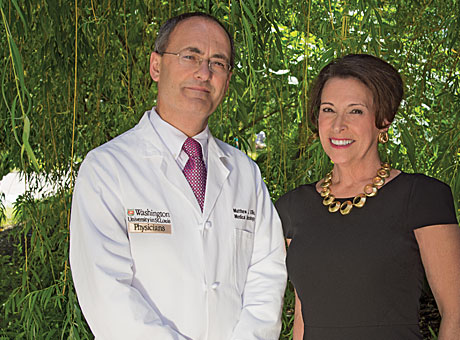
Matthew J. Ellis, MB, BChir, PhD, tailored breast cancer treatments for patient Jeanne Imbs Weitzel.

Matthew J. Ellis, MB, BChir, PhD, tailored breast cancer treatments for patient Jeanne Imbs Weitzel.
The time is coming when all patients diagnosed with cancer will undergo a biopsy to identify the genetic fingerprint of their specific tumor, and then receive tailored therapy to kill it. Groundbreaking research at Washington University School of Medicine is focused on attacking breast cancer at its genetic roots.
Last year, a team of researchers, including Matthew Ellis, MB, BChir, PhD, chief of breast oncology at Washington University and the Anheuser-Busch Professor of Medical Oncology, discovered that breast cancer could be divided into four distinct types, all genetically different and all of which respond differently to various treatments.
“Not all breast cancers are alike. We know that certain medications are highly effective against broad types of breast cancer, but some women don’t respond well to those treatments,” Ellis says.
“Instead of relying on a general ‘recipe’ for combating breast cancer, we need to individualize treatment. We can do that by looking at the genetic components of each patient’s cancer.”
Already Ellis and other researchers have found that a form of breast cancer is genetically more similar to ovarian cancer than to breast cancer, which has striking implications for treatment strategies. Clinical trials here led to the development of a diagnostic test now under review by the U.S. Food & Drug Administration. The test, currently for patients with hormone receptor-positive (HR+) early-stage breast cancer, classifies the cancer and the risk for recurrence based on the biologic components of each patient’s tumor. Ellis hopes the test will receive federal approval later this year.
“Just in the last three years, the research has undergone dramatic advances,” says Jeanne Imbs Weitzel, who benefited from clinical trials. Gene analysis revealed that her cancer would likely not respond to chemotherapy following a mastectomy. Instead she was prescribed an estrogen-suppressing drug. “I wish every woman with breast cancer could experience this kind of personalized approach. “Dr. Ellis gave me complete confidence that the treatment he prescribed was the most appropriate to combat my type of breast cancer.” Weitzel goes on to say, “Dr. Ellis is both brilliant and compassionate; at every appointment I felt like his only patient. His caring approach has had a tremendous impact on my ability to heal.”